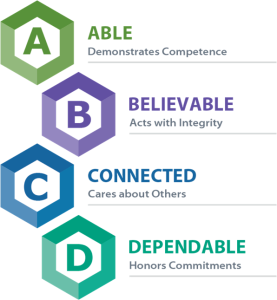 A lack of self awareness is one of the biggest challenges leaders face as they step into increasingly higher management roles.
A lack of self awareness is one of the biggest challenges leaders face as they step into increasingly higher management roles.
“As a leader, you need to be on your best behavior all of the time,” says coaching expert Madeleine Blanchard. “What’s unfortunate is that just when a leader needs increased self awareness, the quality of honest feedback they receive plummets.
“As the leader assumes increased power, followers in the organization start to modify the feedback they provide. Feedback is more positive. The boss’s jokes are always funny and their ideas are always good. People begin to suck up to power in a way that distorts reality for the successful executive, who no longer receives the straight scoop.”
“That can lead to blind spots, especially in the areas of communication and trust,” says Randy Conley. As trust practice leader for The Ken Blanchard Companies, Conley has seen how leaders can struggle—and how they often can be unaware of how they are coming across to others.
“The problems can usually be traced back to one of four areas,” explains Conley. “A leader’s style can cause negative perceptions of their Ability, Believability, Connectedness, or Dependability. Negative perceptions in any of these four areas can lead to decreased trust.
That’s why Conley recommends that leaders take the time to conduct a trust audit, which helps them evaluate where they currently stand, make amends where necessary, and modify their behavior going forward.
“It’s a three-step process where leaders assess their current behavior, apologize if they need to, and act more consistently.
“Assessing behavior involves looking at your conduct in four areas,” explains Conley. “In our Building Trust training program we have leaders look at how they are perceived by others in terms of being Able, Believable, Connected, and Dependable. A problem in any one of these four areas will have a negative impact on relationships and the ability of people to work together successfully.
“Able refers to how people see you as being competent in your role. Do people think you have the skills and experience to get the job done? Sometimes it is a perception issue; sometimes it is a gap in experience. Either way, it needs to be addressed.
 “Believable is always a perception issue—do you act in ways that are consistent with someone who is honest, truthful, and forthcoming? This can be a challenge for leaders as they move up in an organization and feel it necessary to share some information on a need-to-know basis. The problem is that people may perceive the leader is hiding information or not being completely transparent.
“Believable is always a perception issue—do you act in ways that are consistent with someone who is honest, truthful, and forthcoming? This can be a challenge for leaders as they move up in an organization and feel it necessary to share some information on a need-to-know basis. The problem is that people may perceive the leader is hiding information or not being completely transparent.
“Connected is the relationship aspect of trust. Do you demonstrate that you care about people—or do you come across as all business? Working together requires a heart and head connection. In addition to following you for logical reasons, people also want to follow you for emotional reasons. Leaders need to check their style and make sure that they aren’t coming across as cold or aloof.
“Dependable means following through on your good intentions. This trips up a lot of well meaning executives—especially the people pleasers who can’t say ‘no.’ They overcommit themselves and start missing deadlines. They are often surprised to discover how this diminishes people’s trust that they will do what they promise.”
Both Conley and Blanchard caution leaders to be prepared to act on gaps uncovered by the trust audit.
“Make sure you are ready for what you hear,” says Blanchard. “When you invite people to discuss these potentially sensitive areas, you have to be ready to listen. Feedback is a gift. There are only two things an executive should say when they receive feedback—either “thank you” or “tell me more.”
Also, explains Conley, be ready to acknowledge and apologize when necessary.
“You have to own up to areas where you have fallen short. In our program, we train that the most important part of apologizing is being completely sincere—don’t explain, rationalize, or make it the other person’s problem.”
“It’s a simple concept, but one that leaders screw up all the time,” adds Blanchard. “How many times have we heard a senior leader qualify an apology by saying, ‘I’m sorry if my behavior made you feel that way,’ or by explaining, ‘I was only trying to…’
“Less is more when it comes to apologies,” explains Blanchard. “Just say ‘I’m sorry. I hope you will forgive me for the way I have acted in the past.’ If you need to say more, save it for the next step when you explain how you will act differently in the future.”
“Most leaders are trustworthy. It’s just their behavior that gets in the way sometimes,” says Conley.
Interested in learning more about adding trust and coaching skills into a leadership development curriculum? Be sure to check out the Building Trust or Coaching Essentials pages on the Blanchard website.
You can also download copies of the new eBooks
 Do Your Managers Build or Erode Trust
Do Your Managers Build or Erode Trust
 Great Leaders Don’t Tell You What to Do—They Develop Your Capabilities
Great Leaders Don’t Tell You What to Do—They Develop Your Capabilities
Trustworthy behavior leads to trusting relationships. With increased awareness, the willingness to hear feedback, and the humility to apologize for times when trust has been broken, leaders can take a huge leap toward building the types of relationships where people work together to move the organization forward!
About the Author
More Content by David Witt
























